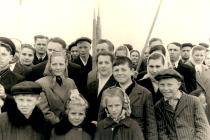This is me (from the left) with my co-students Tarnavskiy and Tselik of the Medical College in Tulchin. This photo was taken after we finished the third year, Tulchin, 1939.
I was born on 7 January 1922. I was given the name of Naftul after my mother's father at the synagogue. According to the rules I had a brit milah on the 8th day after I was born. In 1929, when I turned 7, I went to the 7-year Jewish school. I took a great deal of interest in the living surrounding. I could spend hours watching dragonfly or beetle's wings, or disembowel a frog to see what was there inside. I liked natural sciences and decided that I would become a doctor or a biologist. I began to attend a group of nature studies and the town library where I read almost all books about nature, medicine and animate nature. However, my interests were not limited to nature. I also had other interests. I became a pioneer and was very proud to wear a pioneer neck tie. I remember the ceremony in the newly built club. Mama made a festive dinner. On that day I went to bed wearing my new red neck tie - I didn't want to part with it even in my sleep. I was a rather active pioneer. I had a good memory and I was the fastest of all with learning poems and songs. I took p[art in amateur performances and concerts on Soviet holidays. There were many Soviet songs in Yiddish and I enjoyed singing them on the school stage. For the active pioneer work I was awarded a trip to a pioneer camp in Vinnitsa region. All pioneers from Bershad went there in a bus singing pioneer songs. I particularly liked the morning and evening linings. Before leaving the camp we arranged a concert and a pioneer fire. Well, this was the only time I went to the camp. In summer we usually spent one or two months in the village where my father was working. We stayed in a Ukrainian hut and I ran to the river bank with village boys. Nobody ever mentioned the nationality or the language one spoke. We just didn't bother.
I liked parades on 1 May and 7 November, and taking part in school concerts. There was a Jewish amateur theater in Bershad. It staged plays of popular Jewish authors, mostly of Sholem Aleichem. I often went to the theater with other boys. I also attended the class of political knowledge in this same club that housed the theater. We sincerely believed in the communist ideals and socialism, I read political books and brochures, and even made reports on the current international political situation presenting them at the club and at school. However strange this may sound, my school activities were in no conflict with my Jewish life and education at home. For me my home and school existed separately. The authorities were adamantly struggling against religion, destroying churches and synagogues. We were taught that there was no God and I kind of believed it, but at home I willingly followed our Jewish rules and there was no contradiction between the two spheres of life. Before I was to turn 13 the melamed began to visit our home preparing me for the bar mitzvah. There was the only operating synagogue at the time in Bershad where we celebrated my coming of age. Our neighbors and my friends came to a dinner at home in the evening.
In 1937 I finished school. That same year I entered the general Medical Faculty of the Medical College in Tulchin town near Bershad. I had all excellent marks in my school certificate and had no problem entering this college. I shared my room in the dormitory with 6 other tenants: four Jewish and two Ukrainian guys. Of course, this matter was of no significance for us and we did not just get along well, but were friends. Of course, I could celebrate Sabbath no longer and I had to give up following the kosher rules: carefree and continuously hungry students that we were ate whatever we could get. We received parcels from home, and we opened them and ate the pork at my friend Alyosha had in his parcel and the kigeleh and strudel that my mama brought us. At Easter my Ukrainian friends shared Easter bread with me, and I liked it enormously. Of course, I did my best to celebrate major Jewish holidays with my family at home. At least I never missed my favorite Pesach. I never failed to spend my favorite holiday in the warm atmosphere of my home with my dearest folks. I joined the Komsomol in College. I was also an active Komsomol member and was even elected to the Komsomol committee of my college where I was engaged in the propagandist work. In 1940 I finished my college with honors and was assigned to the position of an assistant doctor in Belyayevka village of Odessa region. There was no doctor in Belyayevka and I had to take care of patients with all kinds of diseases having to take prompt and important decisions. I also assisted at childbirth. There was predominantly Ukrainian population in this village. Its residents showed a great deal of respect to me. First of all, because I was an educated and was in demand. There was a nice library in the village and I continued reading to improve my knowledge. I was one of the very few educated people in the village and I was obliged to conduct political classes, make reports and read lectures on the political situation in the country and in the world.














